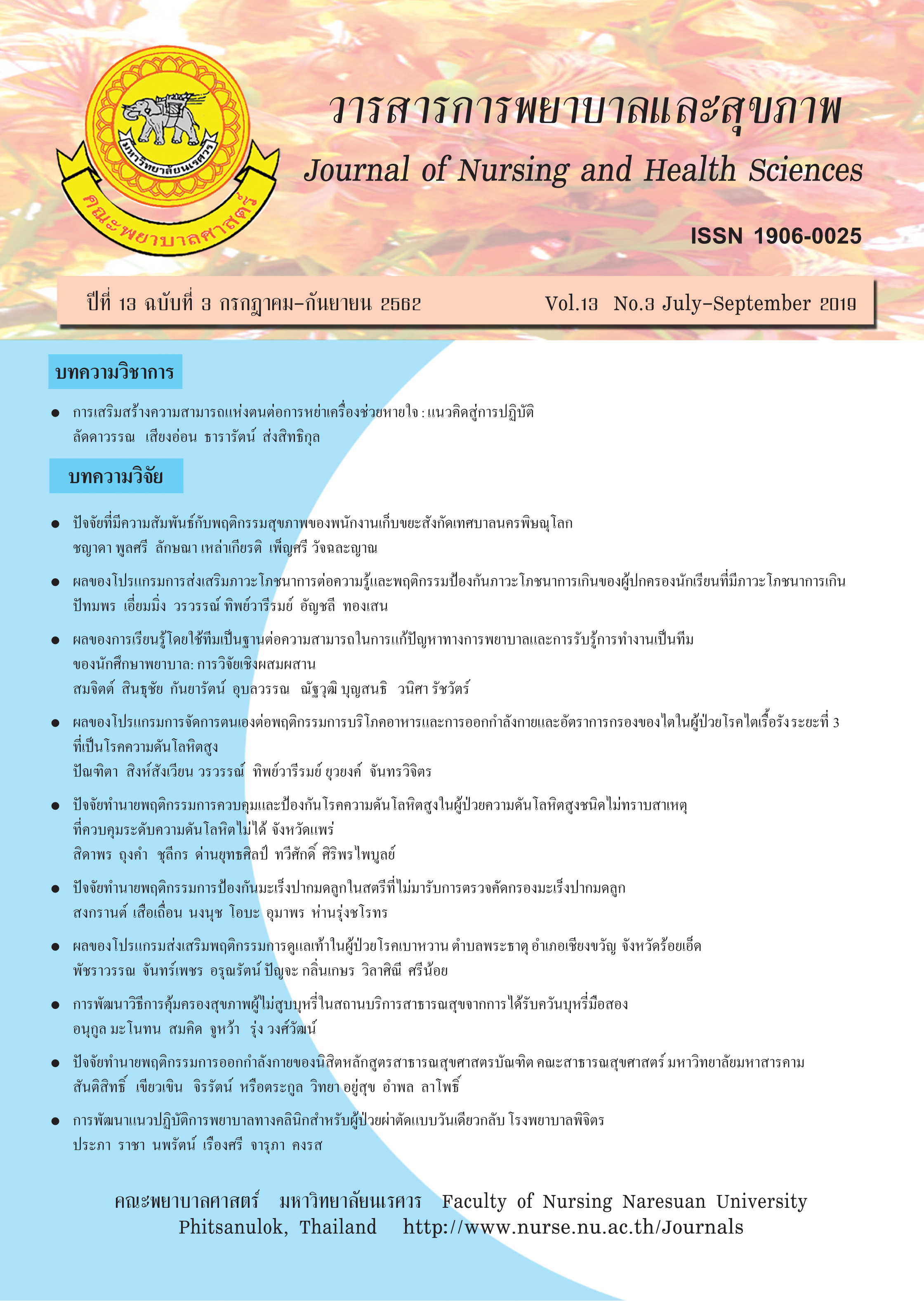ผลของการเรียนรู้โดยใช้ทีมเป็นฐานต่อความสามารถในการแก้ปัญหาทางการพยาบาล และการรับรู้การทำงานเป็นทีมของนักศึกษาพยาบาล
Main Article Content
บทคัดย่อ
การวิจัยนี้เป็นการวิจัยผสมวิธี มีวัตถุประสงค์เพื่อศึกษาความสามารถในการแก้ปัญหาทางการพยาบาล และการรับรู้การทำงานเป็นทีมของนักศึกษาพยาบาล ประชากรของการวิจัย คือ นักศึกษาพยาบาลหลักสูตรพยาบาลศาสตรบัณฑิต วิทยาลัยพยาบาลบรมราชชนนี สระบุรี ชั้นปีที่ 3 จำนวน 108 คน ที่เรียนวิชาการพยาบาลบุคคลที่มีปัญหาสุขภาพ 2 สุ่มกลุ่มตัวอย่างแบบง่ายได้กลุ่มทดลองและกลุ่มควบคุมจำนวนกลุ่มละ 54 คนโดยกลุ่มทดลองได้รับการสอนแบบทีมเป็นฐาน กลุ่มควบคุมได้รับการสอนตามปกติ เครื่องมือที่ใช้ในการวิจัยประกอบด้วย แบบวัดความสามารถในการแก้ปัญหาทางการพยาบาล และแบบวัดการรับรู้การทำงานเป็นทีม สถิติที่ใช้ในการวิเคราะห์ข้อมูลได้แก่ ร้อยละ ค่าเฉลี่ย ส่วนเบี่ยงเบนมาตรฐาน และการทดสอบค่าที
ผลการวิจัยพบว่า 1) กลุ่มทดลองที่ได้รับการสอนแบบทีมเป็นฐาน มีค่าเฉลี่ยคะแนนความสามารถในการแก้ปัญหาทางการพยาบาลหลังทดลองสูงกว่าก่อนทดลองอย่างมีนัยสำคัญทางสถิติที่ .001 2) กลุ่มทดลองที่ได้รับการสอนแบบทีมเป็นฐานมีค่าเฉลี่ยคะแนนความสามารถในการแก้ปัญหาทางการพยาบาลหลังทดลองสูงกว่ากลุ่มควบคุมอย่างมีนัยสำคัญทางสถิติที่ .05 และ 3) การรับรู้การทำงานเป็นทีมของกลุ่มทดลองมีค่าเฉลี่ยเท่ากับ 3.68 โดยผลการสนทนากลุ่มพบว่านักศึกษา 1) มีความสนใจและกระตือรือร้นในการเรียนรู้ 2) ใช้เหตุผลในการแก้ปัญหาและตัดสินใจ 3) มีการพัฒนาทักษะการทำงานเป็นทีม 3) มีความรับผิดชอบ และ 5) มีความพึงพอใจในการเรียนรู้ ผลการศึกษานี้สามารถนำไปใช้ในการส่งเสริมความสามารถในการแก้ปัญหาทางการพยาบาลและทักษะการทำงานเป็นทีมของนักศึกษาพยาบาล
Article Details
เอกสารอ้างอิง
Ancel, G. (2016). Problem-solving training: Effects on the problem-solving skills and self-efficacy of nursing students. Eurasian Journal of Educational Research, 64, 231-246.
Branney, J., & Priego-Hernandez, J. (2018). A mixed methods evaluation of team-based learning for applied pathophysiology in undergraduate nursing education. Nurse Education Today, 61(4),127-133.
Branson, S., Boss, L., & Fowler, D.L. (2015). Team-based learning: application in undergraduate baccalaureate nursing education. Journal of Nursing Education and Practice, 6(4), 59-64.
Boromarajonani College of Nursing Saraburi. (2017). Report of six domains of learning evaluate of graduated student in academic year. Saraburi: Boromarajonani College of Nursing Saraburi. [In Thai].
Cheng, C.-Y., Liou, S.-R., Tsai, H.-M., & Chang, C.-H. (2014). The effects of team-based learning on learning behaviors in the maternal-child nursing course. Nurse Education Today. 34(1), 25-30.
Currey, J., Oldland, E., Considine, J., Glanville, D., & Story, I. (2015). Evaluation of postgraduate critical care nursing students' attitudes to, and engagement with, team basedlearning: A descriptive study. Intensive and Critcal Care Nursing, 31(1), 19-28.
Dearnley, C., Rhodes, C., Roberts, P., Williams, P., & Prenton, S. (2018). Team based learning in nursing and midwifery higher education; asystematic review of the evidence for change. Nurse Education Today, 60, 75-83.
Gallegos, P.J., & Peeters, J.M. (2011). A measure of teamwork perceptions for team-based learning. Currents in Pharmacy Teaching and Learning, 3, 30-35.
Hameed, S., Khalid, T., Aslam, S., Ahmad, M., Farhan, F., Batool, Z., & Hamid, S. (2017). Team based learning in pathology: effect on test scores and student satisfication. Pakistan Armed Forces Medical Journal, 67(3), 423-28.
Huitt, T. W., Kilins, A., & Brooks, W.S. (2015). Team-based learning in the gross anatomy laboratory improves academic performance and students' attitudes toward teamwork. Anatomy Science Education, 8(2), 95-103.
Kim,H., Song,Y., Lindquist,R.,& Kang,H. (2016). Effects of team-based learning on problem-solving, knowledge and clinical performance of Korean nursing students. Nurse Education Today, 38, 115-118.
Medina, M.S., Conway, S.E., Davis-Maxwell, T.S., & Webb, R. (2013). The impact of problem solving feedback on team-based learning case reponses. American Journal of Pharmaceutical Education,77(9),189-194.
Mennenga, H.A. (2013). Student engatement and examination performance in a team based learning course. Journal of Nursing Education ,52(8), 475-479.
Michaelsen, L.K., & Sweet, M. (2011). Team -based learning. Wiley Online Library,128, 41-51.
Ministry of Education. (2017). Qualifications framework fornursing science program 2017. Retrieved 7 June 2019 from: http://www. http://www.mua.go.th/users/tqf-hed/news/data6/ประกาศ-ศธ-NQF-2560-พยาบาลศาสตร์-ป ตรี-PDF. [In Thai].
Ofstad, W., & Brunner, L.J. (2013). Team-based learning in pharmacy education. American Journal of Pharmaceutical Education, 77(4), 1-11.
Park, H., Kim, C., Park, J., & Park, E. (2015). Effects of team-based learning on perceived teamwork and academic performance in ahealth assessment subject. Collegian, 22, 299-305.
Buosonte, R. (2012). Integrated methods for research and evaluation. Bangkok: Chulalongkorn University Printing House. [In Thai].
Roh, Y.S., Lee, S.J., & Mennenga, H., (2014). Factors influencing learner satisfaction withteam-based learning among nursing students. Nuring & Health Science,16, 490-497.
Siah, C-J., Lim,F-P., Lim A-E., Lau,S-T., & Tam, W. (2019). Efficacy of team-based learning in knowledge integration and attitudes among year-one nursing students: A pre- and post-test study. Collegian. https://doi.org/10.1016/j. Colegn.2019.05.003.
Tan, N.C., Kandiah, N., Chan, Y.H., Umapathi, T., Lee, S.H., & Tan, K. (2011). A controlled study of team-based learning for undergraduate clinical neurology education. BMC Medical Education, 11,1-8.
Panich, V. (2013). Creating learning into the 21st century. Bangkok: S. Charoen Printing. [In Thai].
Whitley, H.P., Bell, E., Fuentes, D.G., Helms, K.L., & Maki, D.E. (2015). Practical team-based learning from planning to implementation. Journal of Pharmaceutical Education. 79(10), 1-8.
Yaisoon,S., Rattanaviboon,P., & Chankao,C. (2016). Effects of team-based learning on knowledge and perceived learning outcomes in antenatal care of nursing students. The Thai Red Cross Nursing Journal, 9(2), 73-87. [InThai].


